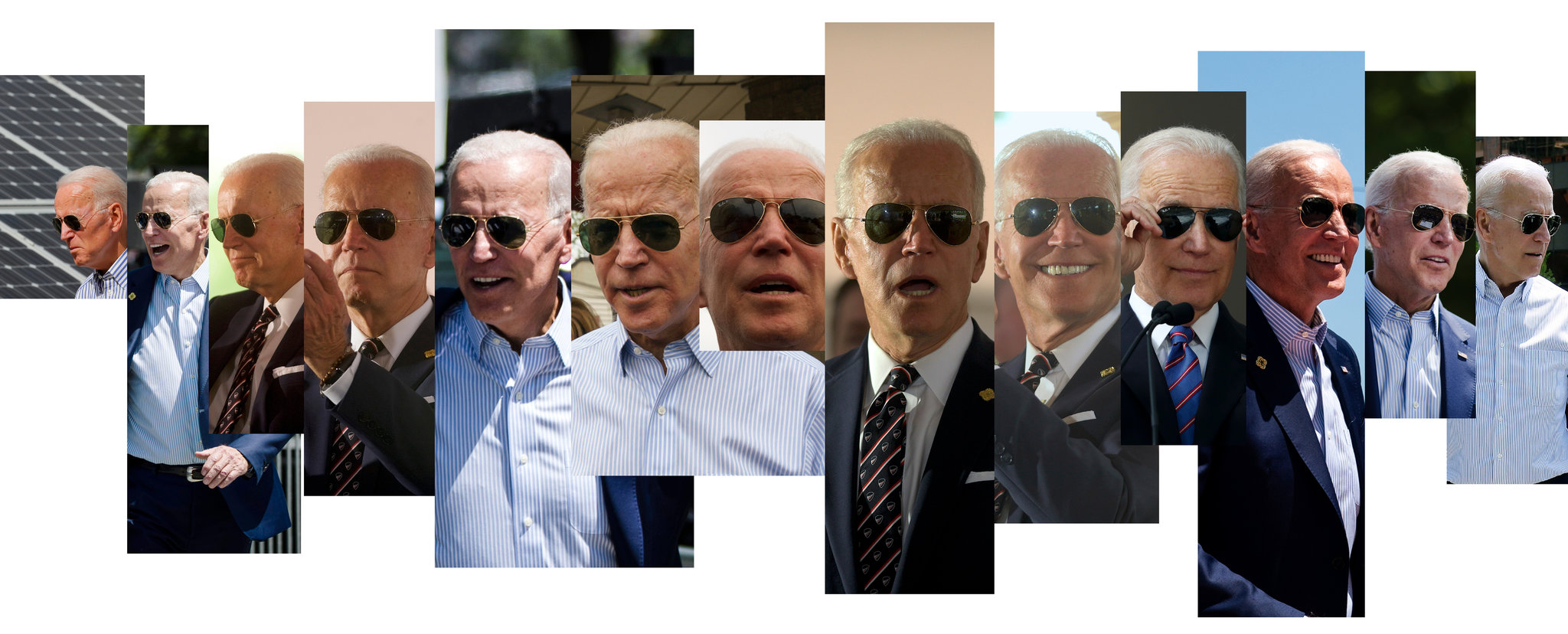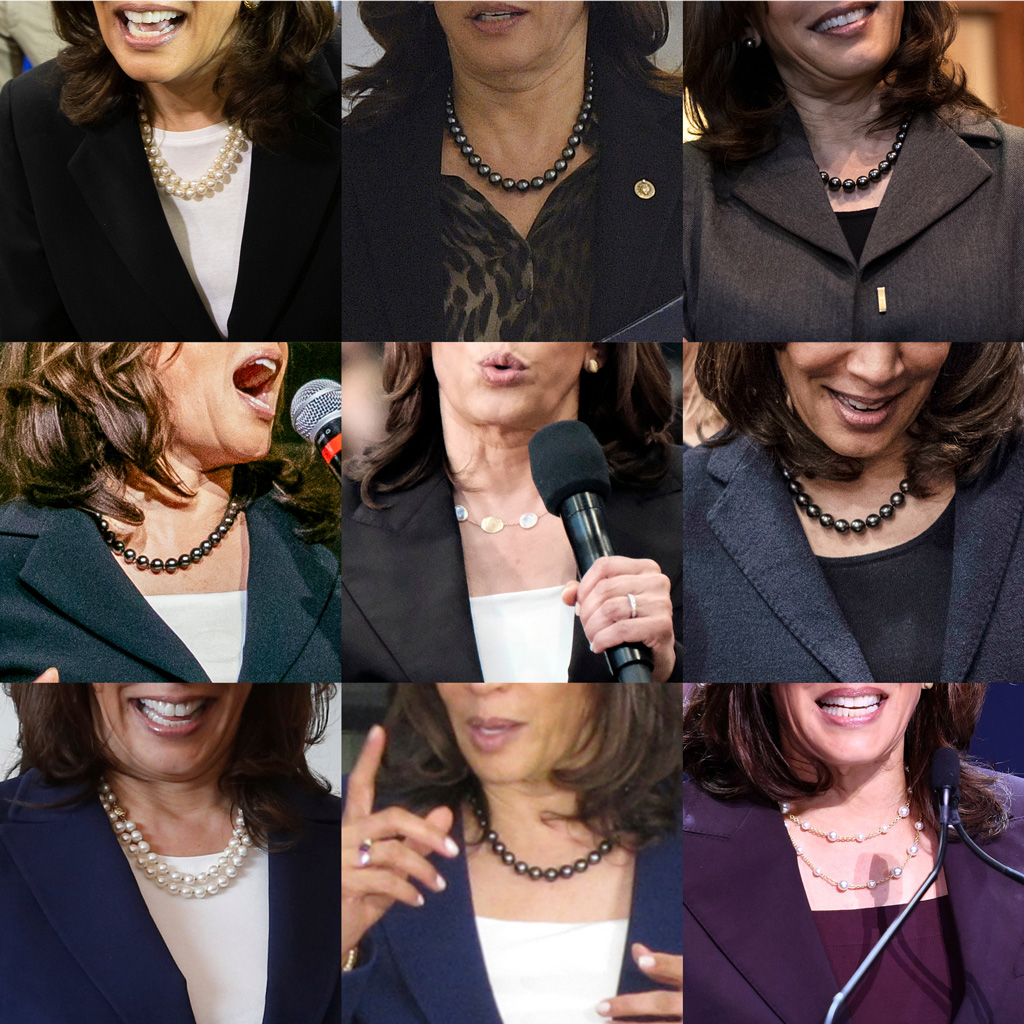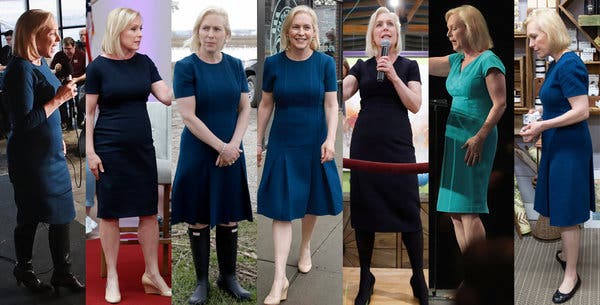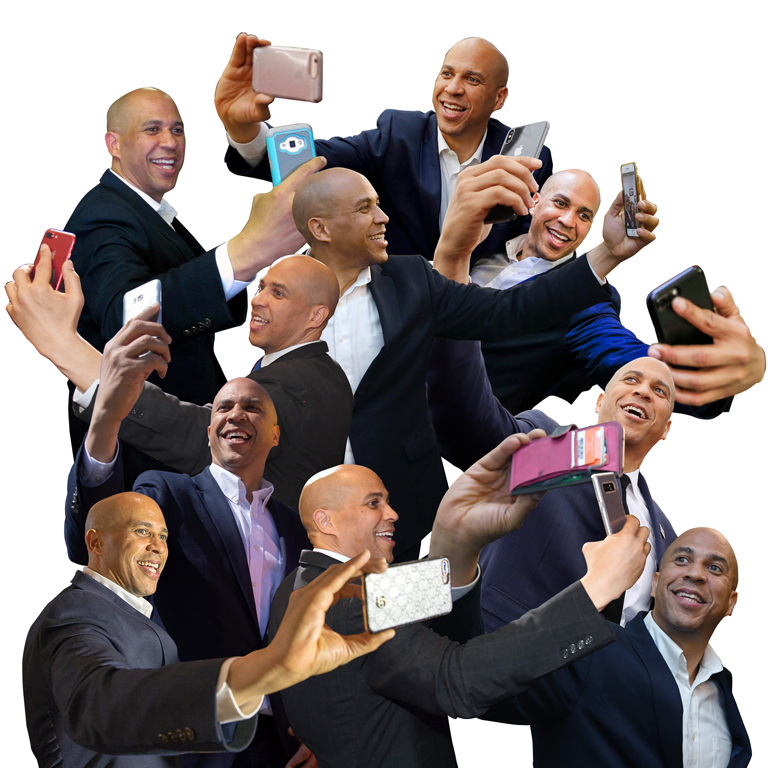A breakdown of what the candidates are saying when they aren’t saying anything at all.
As the 20 Democrats vying for the party’s presidential nomination take to the stage for the first debates of the primary season on Wednesday and Thursday, it is critical, sayeth the pundits, that each one maximizes his or her impact and stands out from the crowd.
But how much standing out can occur when the rules dictate 60 seconds of response time per candidate and 30 seconds of follow-up, meaning each will have, at most, six to 10 minutes, total, to make a case? It’s hard to imagine.
Until you consider that each candidate will be onstage for another 110 minutes — albeit silently. And in that silence lies a whole other communication opportunity.
“When I do media training, I always tell my clients 10 percent of how you are received is what you actually said,” said Hilary Rosen, a Democratic strategist and media consultant with SKDKnickerbocker. “Fifteen percent is how you said what you said, and 75 percent is how you appear.”
Or rather: how you can influence opinion through image making. These are televised debates, after all, and there’s a reason we in the audience are called “viewers.”
“If you are a strategist for one of the top-tier or second-tier candidates, you are thinking through every element of presentation, whether it’s tie color, lapel pin or expression,” said Jen Psaki, a White House communications director in the Obama administration. “And you are doing it with the knowledge that a big part of the way voters make decisions is based on the visual representation the candidate projects.”
Thanks to both the Trump-driven mediagenics of this particular political moment, when going viral is as crucial as going door to door, and the crowded field, the need to make yourself memorable, and imprint your likeness on the retinas of the electorate, has become a campaign imperative. No matter what gender the candidate.
“Men have just as much of a challenge as women,” Ms. Rosen said, pointing out that President Trump understands this implicitly. “He got the last laugh with his hair. And his long tie. He crafted a look, and it helped him stand out.”
To compete, his rivals will have to engage in the same way. “In the back of everyone’s mind will be, ‘How will that person look on a debate stage with Donald Trump?’” Ms. Rosen said.
A few of those running seem to have grasped this reality more firmly than others. Indeed, a handful of the candidates have been relentlessly consistent in defining their own image.
Some of that can be attributed to what Ms. Rosen calls the “Steve Jobs rationale” — reducing both packing and the daily decision-making process of getting dressed frees up brain space for other issues — and some to the desire for keeping clothes from being a subject of conversation. (If you wear the same thing all the time, you don’t leave people much to say.)
But it also has the subconscious effect of essentially creating an emoji for the self, a visual shorthand for values and platforms in a time when — bemoan it or not — we increasingly communicate in pictogram shorthand.
There’s no question that on the debate stage decorum dictates that most participants will play it safe in the classic suit and tie (if relevant). But details matter, and certain precedents have been set.
So, which candidates speak the most clearly when they are not saying anything at all?
Pete Buttigieg

The 37-year-old mayor from South Bend, Ind., has been a savant at using his costume to frame his communications. Relentless in his allegiance to a pristine white shirt, pressed navy dress slacks and a narrow marine blue tie, almost always sans suit jacket, he manages to look Just Like Us (or at least just like the guy from the J. Crew catalog everyone gets).
At the same time, however, he also looks like a one-off in his focus and decision-making capability. (How many of us have the discipline to wear the same thing every single day?)
It is notable that unlike many of his generation, who eschew the tie when attempting to differentiate themselves from their forebears, he has chosen to drop the jacket. That, along with the tie width, give him new-gen cred to go with his new-gen pitch.
But the fact that he still wears a tie, plus at least half of a suit, suggests respect for the establishment’s traditions, and reassures more conservative voters that the first openly gay presidential candidate is not so different from them after all. The color scheme implies blue sky thinking, and the net effect is Boy Scout next door, which, if you are trying to convince older voters of your seriousness of purpose, is badge worthy.
“It’s about consistency,” said Lyn Paolo, a costume designer who worked on “Scandal” and “The West Wing.” If you are consistent, people get an image of you in their heads, and you have carved out a specific space.”
“I use the Halloween rule: Could someone be dressed for Halloween as this candidate and be immediately recognizable?” she said. For Mr. Buttigieg, the answer is yes.
Elizabeth Warren

Along with Mayor Pete, Senator Warren is the candidate with the most clarity in her wardrobe. She has a plan for it! Well, duh.
Her uniform is black pants — “You get the sense she probably has 20 of the same pair of black pants,” Ms. Paolo said — and a black shell with any one of a number of jewel-tone jackets with three-quarter-length sleeves and small lapels. Stud earrings are her only adornment.
Off the stump she often swaps a cardigan for the jacket, but the sleeves are pushed up, in the equivalent of the rolling-up-one’s-sleeves-and-getting-to-work visual favored by many male candidates, and the silhouette is broadly the same.
It is a highly economic way of dressing: streamlined but easily noticeable; unostentatious but animated; thoroughly parsed. Sound familiar?

With his gleaming white teeth and gleaming slicked-back white hair, his many striped shirts and ties and his aviator shades, the former vice president has a D.C. Top Gun-meets-power-casual-club cool that suggests exactly his selling point: He’s the one who can compete with the guy in office.
Mr. Biden is one of the few candidates who still hews to the flag-pin-on-his-lapel, once considered a de rigueur accessory to demonstrate patriotism but now perhaps a relic of an older generation. (If you’re too cool for a jacket, after all, you can’t wear a lapel pin.)
It’s a choice that can work both for and against him. It signals his experience (plus!) but also his long time in Washington (er …), which also suggests his long record of photo ops, which mimics his long record of evolved thinking on various issues.
And speaking of those photo ops, they have given rise to some speculation over the years about certain evolutions in his appearance: that his hair looks fuller, his teeth straighter, his forehead less lined. Maybe it’s the lighting, maybe not, but this could take the conversation in a distracting direction.
Beto O’Rourke

A former congressman from Texas, Mr. O’Rourke is one of the rare candidates to have undergone something of a style about-face since announcing his candidacy.
The Beto of the early days, which was the Beto of the now notorious Vanity Fair cover, the Beto of the dusty road; the questing, existential Beto; the Beto of the people, who was willing to sweat for it and loved jumping on a table — that Beto is gone, victim of the “I was made for this” backlash.
Instead we now have besuited Beto, serious Beto, ready-to-lead Beto and buttoned-up Beto, the better to go with the policy-issuing Beto.
“I guess someone sat him down and told him to get serious,” Ms. Paolo said. “But he owned a look, and it’s like he let someone talk him out of it.” This is the kind of style flip-flop that once got Hillary Clinton in trouble, and Mr. O’Rourke’s renunciation of his former dude-next-door affectation risks making him seem less authentic and trustworthy; less like an outsider than someone who once pretended to be an outsider.
“You have to be careful not to take away the magic that brought him onto the national scene in the first place,” Ms. Psaki said.
Kamala Harris


The only woman in the field to adopt a signature accessory, the senator from California wears a strand of pearls (sometimes a double strand) at practically every appearance. She has them in white and black and pairs them with matching studs, along with a scoop-neck white or black shell, a long black jacket and a matching skirt or trousers.
The pearls soften what could be seen be an intimidating image honed over her years as a prosecutor and embodied by the no-nonsense suiting, and they connect Senator Harris to a long history of women in the White House.
That those women, from Martha Washington to Barbara Bush to Michelle Obama, happen to have been first ladies rather than presidents can be seen as a subtle reminder of how far we’ve come — the way the arc of history could bend toward progress — or a miscue.
“Maybe they’re her lucky pearls,” Ms. Psaki said. “The one thing about accessories like that is that there are always stories to them.” Perhaps this is one worth telling.
Bernie Sanders


Less rumpled than he was in his 2016 bid for executive office, when his trademark messy look became a symbol of his passionate focus on upending the status quo, Senator Sanders is nevertheless still notably more mussed up than the rest of the field.
Whether it’s a tie knot pulled slightly askew, a collar that somehow looks less buttoned down than bunched up, or various strands of hair that cannot be contained, he is the only candidate who dresses as though he hasn’t thought at all about what he is wearing — because, natch, he is too busy thinking about universal Medicare. Which is itself a carefully thought-through meme.
“It works for him,” said Kemal Harris, a former costume designer for Robin Wright in “House of Cards.” “There’s a fine balance between looking your best and being believable.” Sometimes the first has to be sacrificed to the latter.
Kirsten Gillibrand

CreditPhoto Illustration by The New York Times
The senator from New York tends toward dark colors (black, navy, the occasional royal blue) and short-sleeve sheath dresses as seen when she announced her candidacy on “The Late Show With Stephen Colbert,” when she appeared on “The Daily Show With Trevor Noah,” when she was on “The View” — and, well, most any time she is making a statement.
Though Senator Gillibrand made pink the highlight color for her campaign to underscore her position as a champion of women’s issues, she has avoided incorporating it into her wardrobe. Instead her dresses support her platform with a tailored militant femininity (and the occasional kick pleat), to go with her ramrod-straight bob.
“It’s very on-brand,” Ms. Harris said.
Cory Booker


Though the New Jersey senator famously underwent something of a makeover when he became mayor of Newark, excising pleated pants and working on his tie knots, he is thus far the only candidate who has committed a real fashion faux pas, pairing a red fleece vest with a short-sleeve shirt and oversize jeans and getting roundly roasted for it on Twitter.
But given his high-gloss persona, helped by his relationship with the movie star Rosario Dawson, and his high-gloss head, it served to humanize him (especially when he joined the chorus and poked fun at himself).
Senator Booker has been the most relaxed and communicative of the group about his clothing, much as he was one of the first to embrace the selfie trend, the better to model that elusive quality he is sometimes accused of lacking: “authenticity.”
The question now is whether he can distinguish himself further — also an issue for Amy Klobuchar, whose “senator next door” (to quote her book title) ethos, as expressed in her boxy, bright jackets and patterned scarves, skews more than any other candidate toward the Hillary Clinton continuum.
THEY MIGHT TAKE a cue from Andrew Yang, who has been a dedicated model of tech entrepreneur-meets-business-casual style — open-collar shirt, jacket, his own campaign pin on his lapel — an implicit reminder of his outsider status and past start-up success. Ditto the stars-and-stripes scarf he likes to wear. (Don’t just adopt the old lapel pin. Reinvent it!) Just as he wants to reinvent financial security with his “freedom dividend” $1,000-a-month check to every American.
As for those farther on the edges of the debate stage, a few are edging toward establishing their own points of difference, though they haven’t entirely followed through on the commitment.
There is John Hickenlooper, the former Colorado governor, with his Western hip folksiness and affinity for Mr. Rogers-esque V-neck sweaters; Jay Inslee, the governor of Washington, who can often be seen in that rarity, a green tie, presumably to go with his green agenda; and Julián Castro, the former secretary of Housing and Urban Development, playing it very traditional in red ties and navy suitThen there are Marianne Williamson (the self-help guru), Eric Swalwell (California congressman), Michael Bennet (Colorado senator), Tulsi Gabbard (congresswoman from Hawaii), Tim Ryan (congressman from Ohio) and John Delaney (former Maryland congressman), all of whom have yet to really employ the tools of visual argument to advance their respective cases.
Not to mention the New York mayor, Bill de Blasio, though he has one singular advantage, according to Ms. Rosen. He sticks out simply because he’s very tall.
Pete Buttigieg: Joshua Lott/Getty Images, Stephen Lam/Reuters, Scott Olson/Getty Images, Evan Agostini/Associated Press, Elijah Nouvelage/Reuters, Jae C. Hong/Associated Press; Kamala Harris: Jae C. Hong/Associated Press, Scott Eisen/Getty Images, Rebecca Cook/Reuters, Jason Lee/via Associated Press, Steve Marcus/via Associated Press; Joseph Biden: Mark Makela for The New York Times, Lisa Hornak/EPA, via Shutterstock
PHOTO ILLUSTRATIONS BY Jeanne Noonan-DelMundo AND TRACY MA/THE NEW YORK TIMES
Pete Buttigieg (from left): Ethan Miller/Getty Images, Stephen Lam/Reuters, Scott Olson/Getty Images, Sarah Rice/Getty Images, Joshua Lott/Getty Images, Jessica Hill/Associated Press, Jae C. Hong/Associated Press, Evan Agostini/Associated Press, Elijah Nouvelage/Reuters
Elizabeth Warren (from left): Mark Wilson/Getty Images, Jeff Chiu/Associated Press, Eric Thayer for The New York Times, John Minchillo/Associated Press, Sergio Flores/Getty Images, Tamir Kalifa for The New York Times, Jim Weber/via Associated Press, Brian Snyder/Reuters, Rick Bowmer/Associated Press, Charlie Neibergall/Associated Press, Cheryl Senter/Associated Press, Corey Sipkin/Getty Images, Ethan Miller/Getty Images
Joseph Biden (from left): Brian Snyder/Reuters, Matt Rourke/Associated Press, Mark Makela for The New York Times, Matt Rourke/Associated Press, Jessica Griffin via Associated Press, Mark Makela for The New York Times, Mark Makela for The New York Times, Mark Makela for The New York Times, Lisa Hornak/EPA, via Shutterstock, Erin Schaff/The New York Times, Matt Rourke/Associated Press, Steven Senne/Associated Press
Beto O’Rourke (from left): Daniel Acker/Reuters, Ethan Miller/Getty Images, Chip Somodevilla/Getty Images, Bridget Bennett for The New York Times, Ethan Miller/Getty Images, Chip Somodevilla/Getty Images, Bridget Bennett for The New York Times, Bridget Bennett for The New York Times, Ben Brewer/Reuters, John Locher/Associated Press, Gabriela Bhaskar for The New York Times, Charles Krupa/Associated Press
Kamala Harris (from left, top row): Rebecca Cook/Reuters, Scott Sonner/Associated Press, Josh Edelson/Getty Images, Cj Gunther/EPA, via Shutterstock, Mandel Ngan/Getty Images, Stephen Maturen/Getty Images, Curtis Compton/via Associated Press, Steve Marcus/via Associated Press
(from left, bottom row): Jason Lee/The Sun News, via Associated Press, Scott Eisen/Getty Images.Elijah Nouvelage/Reuters, Audra Melton for The New York Times, Richard Vogel/Associated Press, Jordan Gale for The New York Times, John G Mabanglo/EPA, via Shutterstock, Slaven Vlasic/Getty Images
Bernie Sanders (from left, top row): Elizabeth Frantz for The New York Times, J. Scott Applewhite/Associated Press, Getty Images, Erik S Lesser/EPA, via Shutterstock
(from left, bottom row): Scott Olson/Getty Images, Sarahbeth Maney for The New York Times, Mandel Ngan/Getty Images, Paul Sancya/Associated Press
Kirsten Gillibrand (from left): Scott Olson/Getty Images, Charlie Neibergall/Associated Press, Nati Harnik/Associated Press, Bryon Houlgrave/via Associated Press, Paul Sancya/Associated Press, Scott Olson/Getty Images, Cj Gunther/EPA, via Shutterstock
Cory Booker (from left): Alyssa Pointer/via Associated Press, Jae C. Hong/Associated Press, Ethan Miller/Getty Images, Ethan Miller/Getty Images, Ethan Miller/Getty Images, Ethan Miller/Getty Imasges, Christopher Aluka Berry/Reuters, Tannen Maury/EPA, via Shutterstock, John Locher/Associated Press, Scott Sonner/Associated Press








